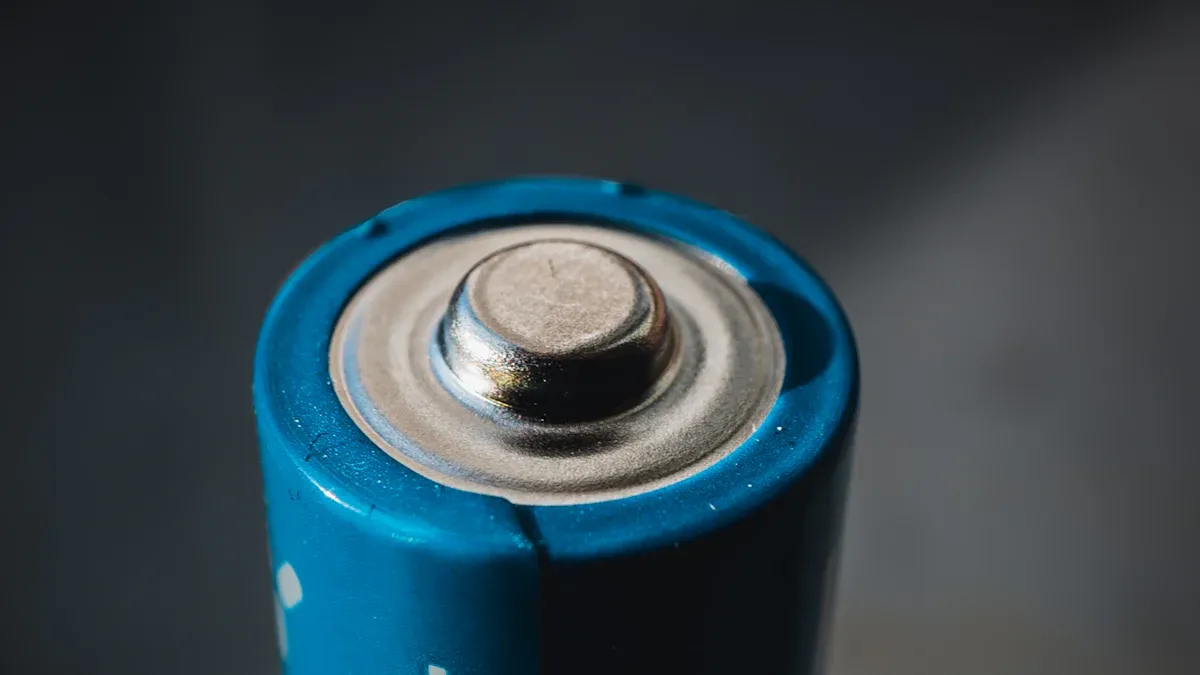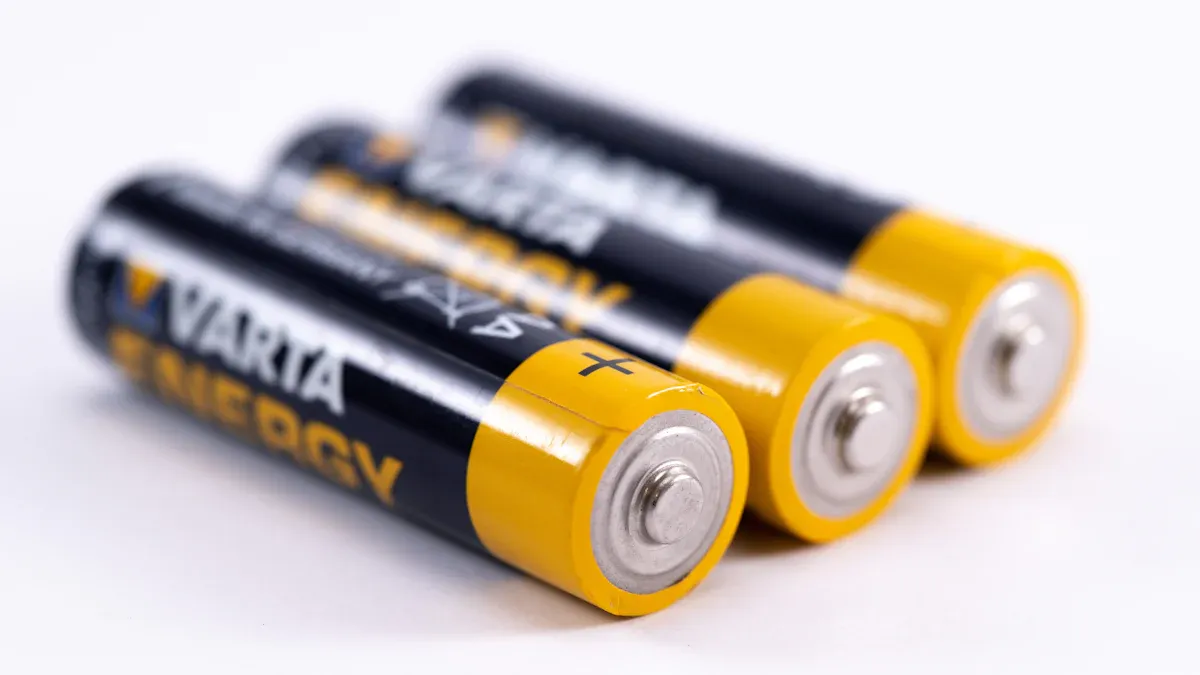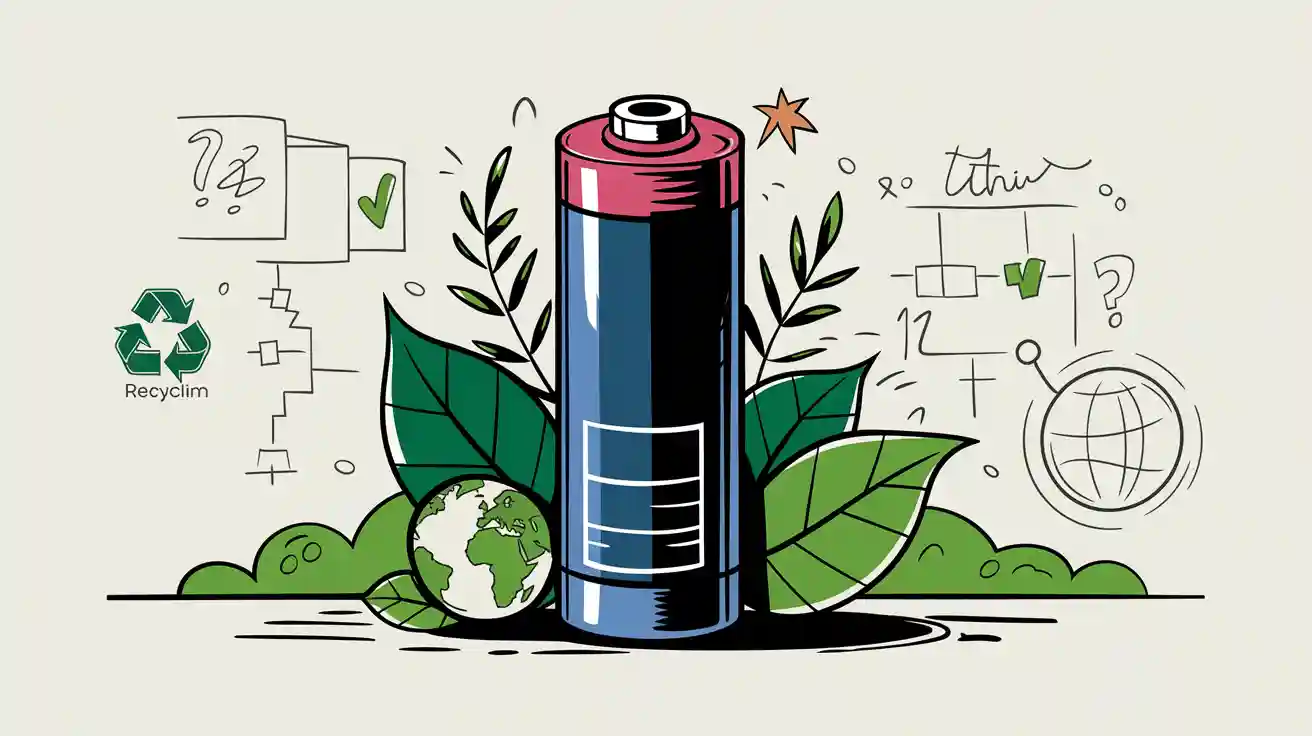Contents
When picking lithium or alkaline batteries, think about key points. These batteries vary in power, voltage, life, price, and eco-friendliness. For example:
- Lithium batteries store 150-250Wh/kg of energy. Alkaline batteries store 90-120Wh/kg.
- Lithium batteries last 500-1000 uses. Alkaline batteries last about 300 uses.
- Lithium batteries cost more at first but save money later because they last longer.
Choose based on your device’s power needs, budget, and eco goals.
Key Takeaways
- Lithium batteries last longer and hold more power than alkaline ones. They are great for devices that use a lot of energy.
- Alkaline batteries cost less and work well for low-energy devices. However, they need to be replaced more often.
- Think about the environment when choosing batteries. Lithium lasts longer but is harder to recycle. Alkaline is easier to throw away but creates more trash.
- Pick the right battery for your device. Use lithium for high-energy gadgets and alkaline for regular items.
- Store batteries correctly and check expiration dates. This helps them last longer.
Overview of Lithium or Alkaline Batteries
What Are Lithium Batteries?
Lithium batteries are a type of battery that uses lithium. They have high energy, last long, and work well. These batteries are used in cameras, medical tools, and electronics needing steady power.
Here are some key facts about lithium batteries:
| Feature | Details |
|---|---|
| Energy Storage | 150-250 Wh/kg |
| Usage Life | 500 to 1,500 uses (up to 6,000 for some types) |
| Monthly Power Loss | 2-3% |
| Total Lifespan | 3 to 10 years (over 10 years for some types) |
The demand for lithium batteries is growing fast. By 2032, the market may reach USD 42.34 billion. It is growing at 6.44% yearly from 2024 to 2032. Big companies like Panasonic and Samsung are working to make them even better.
What Are Alkaline Batteries?
Alkaline batteries have been popular since the 1900s. They are cheap, easy to find, and work well. These batteries use zinc and manganese dioxide with an alkaline liquid to create power.
Alkaline batteries are best for things you don’t use often. Examples include remotes, flashlights, and clocks. Their main features are:
| Feature | Details |
|---|---|
| Price | Cheapest per battery |
| Performance | Works well until it runs out |
| Storage Life | 5 to 10 years |
| Best Uses | Devices not used often |
New designs have made them store more energy and last longer. But recycling them is still hard, which affects the environment. Even so, they are still popular because they are cheap and simple to use.
Key Differences Between Lithium or Alkaline Batteries

Energy Density
Lithium Batteries: High Energy Storage
Lithium batteries store a lot of energy, about 150-250 Wh/kg. This means they can power devices longer, like cameras or medical tools. For example, they can run for 2-4 hours. Alkaline batteries don’t last as long. Lithium batteries are great for devices needing steady power.
Alkaline Batteries: Moderate Energy Storage
Alkaline batteries store less energy, around 90-120 Wh/kg. They work well for low-power items like remotes and clocks. They are cheaper but only last 1-2 hours in use. For everyday needs, their low price and easy availability make them useful.
| Battery Type | Energy Density (Wh/kg) | Runtime |
|---|---|---|
| Lithium | 150-250 | 2-4 hrs |
| Alkaline | 90-120 | 1-2 hrs |
Voltage and Performance
Lithium Batteries: Consistent High Voltage
Lithium batteries keep a steady voltage of 1.5-3 volts. This helps devices work well without losing power suddenly. They also work in very hot or cold places, making them reliable.
Alkaline Batteries: Voltage Declines Over Time
Alkaline batteries start at 1.5 volts but lose power as they are used. This drop can make devices stop working properly. They also don’t handle temperature changes well, which affects their performance.
- Nominal Voltage: Lithium (1.5-3 volts) vs. Alkaline (1.5 volts)
- Runtime: Lithium (2-4 hours) vs. Alkaline (1-2 hours)
- Temperature Sensitivity: Lithium works in extremes; alkaline struggles.
Lifespan and Shelf Life
Lithium Batteries: Long-Lasting and Low Self-Discharge
Lithium batteries last 10-15 years and can be stored for 10-20 years. They lose very little power when not used, less than 1-2% each month. This makes them great for emergencies or devices you don’t use often.
Alkaline Batteries: Shorter Lifespan and Higher Self-Discharge
Alkaline batteries last 6 months to 2 years and can be stored for 5-10 years. They lose power faster when not in use. They are good for short-term needs but not for long-term storage.
| Battery Type | Lifespan | Shelf Life | Self-Discharge Rate |
|---|---|---|---|
| Lithium | 10-15 years | 10-20 years | <1-2% per month |
| Alkaline | 6 months to 2 years | 5-10 years | Higher |
Cost
Lithium Batteries: Higher Initial Price
Lithium batteries cost more when you first buy them. They can be up to five times pricier than alkaline batteries. But they last longer and store more energy, saving money over time. For example, lithium batteries work 8 to 10 times longer than alkaline ones. This means fewer replacements and better value for devices needing steady power.
Here’s a simple comparison:
| Comparison Factor | Lithium Battery | Alkaline Battery |
|---|---|---|
| Production Cost | Higher | Lower |
| Cost-Effectiveness | Higher | Lower |
| Long-Term Cost | Lower | Higher |
If you need batteries for high-power devices or long-term use, lithium batteries are worth the extra cost. But for short-term or low-power needs, alkaline batteries are cheaper upfront.
Alkaline Batteries: Cheaper Option
Alkaline batteries are known for being affordable. They are the least expensive choice, perfect for everyday items like remotes and clocks. However, they don’t last as long, so you’ll need to replace them more often. Over time, this can make them cost more than lithium batteries.
If you want to save money now and use batteries for low-power devices, alkaline batteries are a good pick. But for long-term savings, lithium batteries are better.
Environmental Impact
Lithium Batteries: Harder to Recycle
Lithium batteries can harm the environment if not handled properly. They have toxic materials and can catch fire or explode if thrown away carelessly. The EPA says most lithium batteries are hazardous waste. Recycling them is hard but important. It saves valuable materials and lowers pollution. Old lithium batteries can be reused to make new ones.
Recycling also helps with clean energy efforts. It reduces risks from improper disposal. But recycling lithium batteries needs special facilities, making it more complicated.
Alkaline Batteries: Easier to Dispose Of
Alkaline batteries are less harmful to the environment. They don’t have toxic materials like lithium batteries. In many places, you can throw them in regular trash, though recycling is better. But since they don’t last as long, you’ll need to replace them more often. This creates more waste over time.
| Battery Type | Environmental Impact | Disposal Method |
|---|---|---|
| Alkaline Batteries | Less toxic; fewer harmful materials; may leak chemicals in landfills | Can go in household trash; recycling is better |
| Lithium Batteries | More toxic; risk of fire or explosion; harder to recycle | Needs special recycling processes; more energy-intensive |
To reduce environmental harm, think about the trade-offs. Lithium batteries last longer but need careful recycling. Alkaline batteries are easier to throw away but create more waste because they don’t last as long.
Applications of Lithium or Alkaline Batteries

High-Drain Devices
Lithium Batteries: Great for Powerful Devices
Lithium batteries work best for devices needing lots of energy. They have high energy and steady power, making them reliable. These batteries are used in gadgets like power tools, drones, and cameras.
- Lithium batteries are ideal for high-energy devices like cameras.
- They last longer and perform well, even with heavy use.
- Their steady power keeps devices running without stopping suddenly.
For devices that use a lot of energy, lithium batteries are the top pick. They last longer and need fewer replacements.
Low-Drain Devices
Alkaline Batteries: Good for Everyday Items
Alkaline batteries are great for devices that don’t use much power. They are cheap and easy to find, making them perfect for daily use.
- Alkaline batteries work well in remotes, clocks, and flashlights.
- They are affordable and available almost everywhere.
- Experts say they are the best for low-power gadgets.
If you need batteries for things you use sometimes, choose alkaline. They are reliable and cost less.
Extreme Temperatures
Lithium Batteries: Work Well in Tough Weather
Lithium batteries perform well in very hot or cold places. They are good for outdoor or industrial use because they stay reliable.
| Temperature Condition | How Lithium Batteries Perform |
|---|---|
| Cold Weather | Power drops slightly but still works |
| Hot Weather | May lose efficiency without cooling systems |
In cold weather, lithium batteries lose some power but still work better than alkaline. In heat, they need cooling to stay safe and effective.
Alkaline Batteries: Struggle in Harsh Weather
Alkaline batteries don’t do well in extreme temperatures. They work best in mild conditions between 20°C and 25°C.
| Temperature Range | How Alkaline Batteries Perform |
|---|---|
| Best Range (20°C-25°C) | Full power and good performance |
| Over 30°C | Power drops; may leak |
| Below -18°C | Power drops a lot |
For tough weather, lithium batteries are the better choice. Alkaline batteries are better for normal conditions.
How to Choose Between Lithium or Alkaline Batteries
Match Battery Type to Device Needs
Pick the right battery based on your device’s use. Different batteries work better for certain gadgets.
- Alkaline batteries: Great for low-power items like remotes, clocks, and flashlights.
- Lithium batteries: Best for high-power devices like cameras, drones, and GPS units.
- NiMH batteries: Rechargeable and good for things you use often, like toys.
- Ni-Zn batteries: Ideal for tools or gadgets needing higher voltage, like power tools.
Think about how much power your device needs and how often you use it. For example, if you rarely use a flashlight, alkaline batteries are fine. If you use a camera that drains power fast, lithium batteries are better.
Balance Cost and Performance
Balancing cost and performance helps you save money and meet your needs. Lithium batteries cost more at first but last longer, saving money over time. Alkaline batteries are cheaper upfront but need replacing often, which costs more later.
| Battery Type | Initial Cost | Long-Term Value |
|---|---|---|
| Lithium | High | Cost-effective |
| Alkaline | Low | Expensive later |
Lithium batteries also last longer and can be used more times than alkaline ones.
| Battery Type | Charge Cycles | Lifespan |
|---|---|---|
| Lithium | 500–2000+ cycles | 5–10 years |
| Alkaline | Not rechargeable | Single-use only |
If you need batteries for long-term use or high-power devices, lithium is worth it. For short-term or low-power needs, alkaline is a cheaper choice.
Consider Environmental Sustainability
Think about the environment too. Lithium batteries last longer, so they create less waste. But they are harder to recycle and can harm the environment if not disposed of properly. Recycling them helps recover useful materials.
Alkaline batteries are easier to throw away and less harmful. But since they don’t last as long, you’ll use and toss more of them, creating more waste. To help the planet, recycle both types when you can.
By choosing the right battery for your device, balancing cost and performance, and thinking about the environment, you can make a smart choice. Whether you pick lithium or alkaline, knowing their pros and cons helps you get the best value.
Plan for Long-Term Usage
Thinking ahead about batteries saves money and reduces waste. It also helps your devices work well. Keep these tips in mind:
- Pick Batteries Based on How Often You Use Them
Use rechargeable lithium batteries for things you use daily, like keyboards or controllers. They last longer and need fewer replacements. For items you rarely use, like flashlights or smoke alarms, alkaline batteries are cheaper and have a good shelf life. - Store Batteries the Right Way
Storing batteries properly makes them last longer. Keep them in a cool, dry spot, away from sunlight. Heat can harm both lithium and alkaline batteries. For example, hot places can make lithium batteries wear out faster.
Tip: Use a battery holder to organize different types. This avoids mixing them, which can cause leaks or poor performance.
- Check Expiration Dates
Batteries lose power over time, even if unused. Look at the expiration date on the package. Use older ones first to avoid wasting them. For long-term storage, lithium batteries are better because they lose less power when not used.
| Battery Type | Best for Long-Term Use? | Why? |
|---|---|---|
| Lithium Batteries | ✅ Yes | Low self-discharge, long lifespan |
| Alkaline Batteries | ❌ No | Higher self-discharge, shorter life |
Planning ahead helps batteries last longer and saves money. Match the battery to your device and store them properly for the best results.
FAQ
1. Can you mix lithium and alkaline batteries in one device?
No, mixing them is not safe. Lithium and alkaline batteries have different power levels and usage rates. Using both together can harm your device or cause leaks. Always stick to the same type and brand for best results.
2. Are lithium batteries rechargeable?
Some lithium batteries can be recharged, like lithium-ion ones. Others, like primary lithium batteries, cannot. Always check the label to see if it’s rechargeable before using it.
3. Why do alkaline batteries leak?
Alkaline batteries leak when overused or stored the wrong way. The liquid inside can escape and damage devices. To avoid this, take out batteries from unused items and keep them in a cool, dry spot.
4. Which battery is better for kids’ toys?
Alkaline batteries are safer for toys because they don’t overheat easily. Make sure the battery cover is secure so kids can’t reach them or accidentally swallow them.
5. How should you throw away lithium and alkaline batteries?
Recycle lithium batteries at special centers to protect the environment. For alkaline batteries, follow local rules. Some places allow trash disposal, but recycling is better to reduce waste.
Tip: Keep used batteries in a safe container until you can recycle them.





